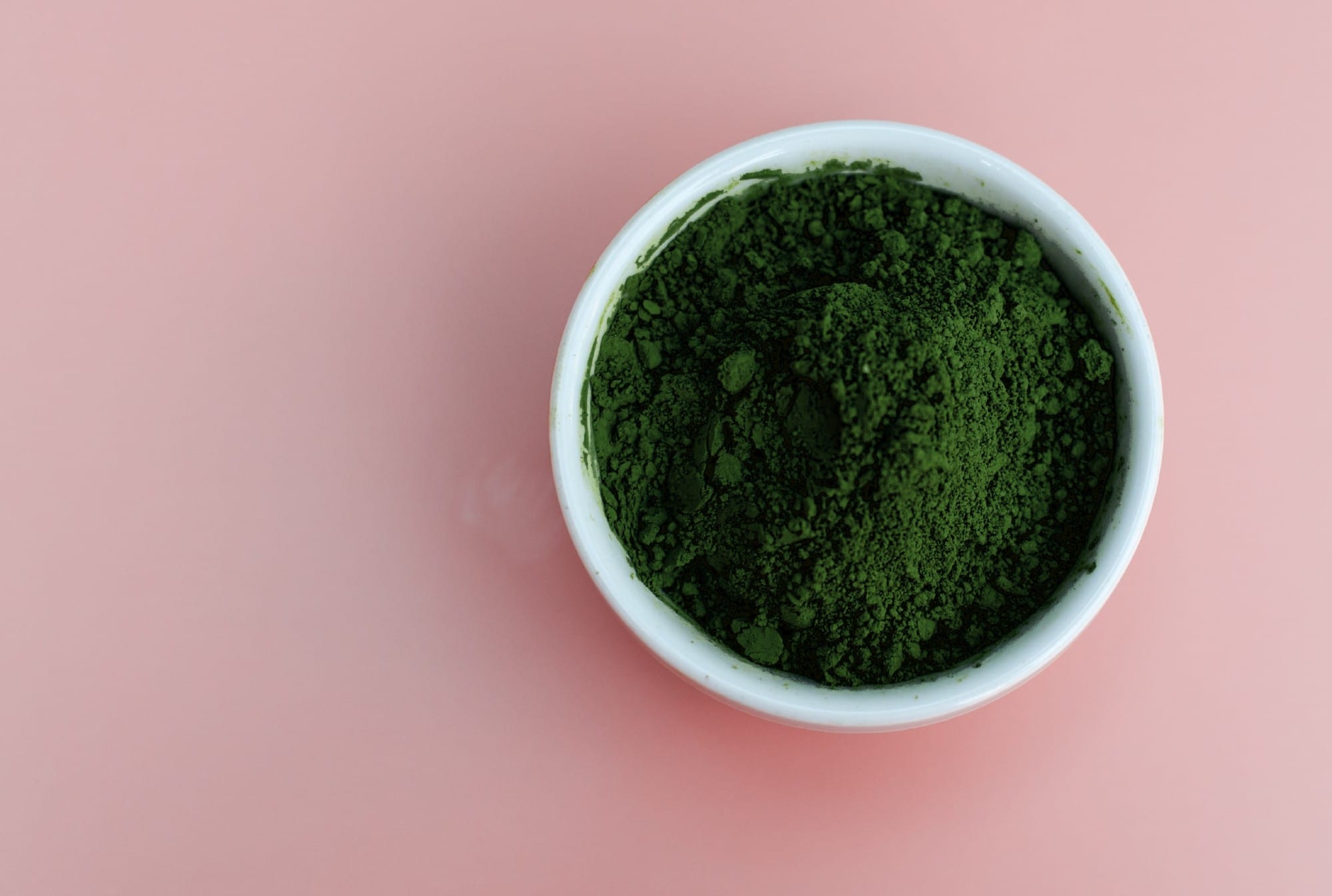As dog parents are becoming more conscious about what they feed their pup, many are incorporating human food into their diet. That’s because a lot of what we feed our dog during mealtime provides the bare minimum nutritional requirements. While dogs are no strangers to carrots, apples, and blueberries tossed their way, some new human foods are making waves – and rightfully so.
Spirulina is one of them. The microscopic algae, grown in both in salt and fresh water, comprises an extraordinarily high volume of protein (around 60%, according to the FDA) and is dense in nutrients. It contains significant amounts of beta carotene; iron; vitamin A, E, and B; potassium, and minerals, among other good-for-your-dog ingredients. And when taken in the correct dosage, it may provide a range of health benefits for your dog.
“Aside from being packed full of trace minerals, spirulina is rich in carotenoid antioxidants that may help to improve gastrointestinal function, strengthen the immune system and aid in allergy relief,” says Sarah Lyman, a clinical pet nutritionist at Bonafide Pet Nutrition & Counseling.
Related: Here Are the Sea Veggies That Could Boost Your Dog’s Health
The Main Benefits of Spirulina For Dogs
Besides being rich in nutrients, antioxidants, vitamins, and minerals, spirulina is believed to have an array of health benefits for dogs. But before you introduce any new food or ingredient into your dog’s diet, make sure you consult a veterinarian or nutritionist.
1. May Reduce Allergies in Dogs
Over the past 10 years, there has been a 30% increase in environmental allergy cases, according to a report from Banfield Pet Hospital. The team also found that dogs with food allergies are more prone to skin infections. If your dog suffers from allergies, spirulina could help.
“Spirulina is the source of the anti-inflammatory Gamma Linoleic Acid (GLA), an essential fatty acid which can aid in allergy relief,” says Lyman.
Indeed, research has shown spirulina may help with allergies in dogs because it has anti-inflammatory properties that are paired with the algae’s natural antihistamine properties.
2. Could Improve Digestion and Gastrointestinal Health in Dogs
If your dog has trouble with her digestion or gastrointestinal health, spirulina could help. The microscopic algae has shown to be beneficial in ridding a dog’s body of dangerous gut bacteria and improving bowel function. Essentially spirulina quells bad bacteria while promoting healthy gut flora that a dog’s body needs – and this could mean an increase in your dog’s energy.
3. Supports Strengthening a Dog’s Immune System
When a dog’s immune system in compromised, our furry friend may become vulnerable to diseases, including disuffer from poor immune system health, spirulina may help, as it’s known to possess various minerals and vitamins to boost the immune system.
For example, some of the key properties found in spirulina are polysaccharides, phytonutrients, and sulfolipids. All these properties play a vital role in strengthening a dog’s immune system, which in turn helps your pet fight off unwanted infections while promoting healthy cell growth.
“The primary medicinal activity of spirulina is it helps with cleansing the blood. It contains the antioxidant called superoxide dismutase which is a scavenger of free radicals in the body,” says Lyman.
In addition, spirulina has been shown to promotes cell generation, which is an integral part of maintaining a healthy immune system in dogs.
4. A Potential Tool to Fight Back Against Cancer in Dogs
Nearly half of all dogs over the age of 10 will develop cancer, according to the American Veterinary Medical Foundation. If you are worried about your dog developing this disease, spirulina may be a supplement to consider.
Due to the numerous healthy properties of spirulina, it is recognized as a potential cancer-fighting superfood, as studies have shown it may protect against DNA mutations. Not only is it good for helping to prevent cancer, but it is also beneficial for those dogs that already have the disease.
“The beautiful green color of spirulina called phycocyanin has been reported to inhibit cancer formation and may enhance neurotransmitter formation,” says Lyman.
Spirulina can do this because it stimulates natural killer cells and other immune components in a dog’s immune system, which help to fight cancer cells. Additionally, the blue-green algae may work to repair certain parts of a dog’s genetic material that has been damaged from radiation treatments commonly used to treat cancer.
5. Could Help Get Rid of Bad Dog Breath
Because spirulina is a great source of chlorophyll (what gives plants their green color), the biomolecule is believed to help support waste elimination. It also has beneficial deodorizing effects, it may help eliminate odors.
How To Feed Your Dog Spirulina
There are a number ways to give your dog spirulina. Some people buy supplements, others sprinkle a spirulina powder on their dog’s food.There are functional treats with spirulina in them, including Bye Bye Dog Breath dental sticks.

SHOP NOW
“Pet parents should choose a product without artificial colorings, flavorings, preservatives, and ask the manufacturer whether their product has been checked for contamination as some strains have been harvested from sources contaminated with heavy metals,” says Lyman.
Are There Any Side Effects Associated With Giving Your Dog Spirulina?
When introducing any new supplement or ingredient into your dog’s diet, there is always the possibility of side effects.
“It is safe to use daily but because its nutrient content is so concentrated, it can cause diarrhea and digestive upset if consumed in excessive quantities,” says Lyman.
Related: Essential Dog Nutrition: 6 Vitamins Your Pup Needs in His Diet
And as mentioned above, the blue-green algae may be contaminated with metal during harvesting.
If your dog is on other medications, spirulina could interact with them.
This is why it’s crucial to follow vet and pet nutritionist recommendations before giving your dog spirulina.
What To Remember When Choosing Spirulina For Your Dog
Before you introduce spirulina into your dog’s diet, do your research, as not all are not created equally. Look for reputable brands and read the label carefully to understand the concentration level and dosage. Also, check to see if they use third-party verification for authenticity and see where the company gets its spirulina from. And if you have questions, ask.
“Adding spirulina to your dog’s diet is a great way to boost their overall health and well-being,” Says Lyman. “Taking the time to research the company of the spirulina product you intend to buy is key. Some companies can cut corners to save money – if a product price is cheap, it is likely produced in a poor manner and potentially contaminated.”
Related: Meet the Guy Obsessed With Dog Food Recalls
This article is for informational purposes only. It is not, nor is it intended to be, a substitute for professional medical advice, diagnosis, or treatment and should never be relied upon for specific medical advice.




















